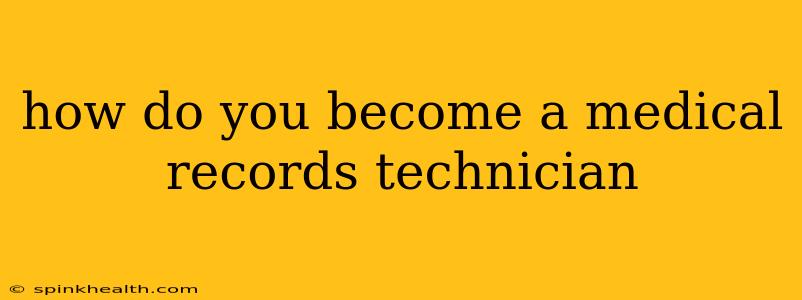From Aspiring Technician to Medical Records Pro: Your Journey Begins
The crisp scent of paper, the quiet hum of computers, the vital role in patient care – this is the world of a medical records technician. But how do you get there? It’s a journey paved with education, training, and a commitment to accuracy and detail. Let's explore the path to becoming a successful medical records technician.
What Education and Training Do I Need to Become a Medical Records Technician?
This is often the first question on aspiring technicians' minds. The good news? There are several pathways available, catering to different learning styles and schedules. Many opt for a formal associate's degree in health information technology (HIT) or a related field. These programs typically take two years to complete and provide a comprehensive understanding of medical terminology, coding systems (like ICD-10 and CPT), record management, and data privacy regulations like HIPAA.
Alternatively, some individuals pursue a certificate program, often shorter and more focused on specific aspects of medical records management. These programs might be ideal for those already working in healthcare and seeking to upskill or change career paths within the field. Online programs are also increasingly popular, offering flexible learning options.
What are the Specific Job Duties of a Medical Records Technician?
The day-to-day tasks of a medical records technician are diverse and crucial to the smooth functioning of any healthcare facility. Imagine yourself navigating a complex system, ensuring patient information is accurate, accessible, and secure. You'll be responsible for:
- Maintaining Patient Records: This involves organizing, filing, and retrieving both physical and electronic medical records. Accuracy is paramount, as incorrect information can have serious consequences.
- Coding and Abstracting Data: You'll use established coding systems to translate medical diagnoses and procedures into standardized codes used for billing, statistical analysis, and research.
- Data Entry and Management: Electronic health records (EHRs) are the backbone of modern healthcare, and you'll be skilled in entering, updating, and managing patient data within these systems.
- Ensuring Compliance: HIPAA regulations are crucial, and you'll play a key role in ensuring patient privacy and data security.
- Release of Information: You'll be responsible for handling requests for patient information, ensuring compliance with regulations and proper authorization.
What Certifications are Available for Medical Records Technicians?
While not always mandatory, certifications can significantly boost your career prospects. The Registered Health Information Technician (RHIT) credential, offered by AHIMA (American Health Information Management Association), is highly regarded and demonstrates competency in the field. Achieving this certification requires passing a rigorous exam, often following the completion of a formal education program. Other certifications are available, and the specific requirements will vary based on the organization offering the credential.
What is the Job Outlook for Medical Records Technicians?
The healthcare industry is constantly evolving, and the need for skilled medical records technicians is only growing. The increasing use of electronic health records and the growing emphasis on data management mean that qualified professionals are in high demand. This creates excellent career opportunities with good potential for growth and advancement.
How Much Does a Medical Records Technician Make?
Salaries vary based on experience, location, and employer. However, you can expect a competitive salary and benefits package. Researching average salaries in your specific area will give you a better idea of what to expect.
The journey to becoming a medical records technician is rewarding, demanding, and essential to the healthcare system. It's a career where precision and attention to detail meet the profound satisfaction of contributing to patient care. By understanding the necessary education, training, and certification options, you can embark on this fulfilling path with confidence.

